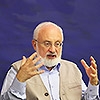My Thoughts On Twitter 12/27/19

If the group has taken on any condition for its advancement, then I may agree with them or not, but until I come to share in the group’s opinion, I will not fulfill the law of mutual guarantee, and that means I will not be aimed at spirituality, at the goal of creation, the goal of life, the Creator, who is in the center of the group.
Mutual guarantee is the iron law of the spiritual system. At every moment it returns us to bestowal, to faith above reason, to being directed at the goal, compelling us to be included in the group and to bow down before the ten. All of this is part of the law of mutual guarantee in order to become human in the system of Adam HaRishon.
I must constantly check how much I agree with the group, with the teacher, with what Kabbalists write, and in this way, direct myself toward correction with ever-greater precision. This is what correction is, in essence.
As a result of correction, the friend and Creator merge together for me into one image. I do not differentiate them from each other because my egoism is completely corrected and cannot see differences in them. All the differences that I see around me now are depicted inside of my uncorrected egoism.
To the extent I feel a lack of mutual guarantee inside me and make efforts to attain it, extend a prayer, and include myself in the group, to this extent I advance and elevate myself from the path of suffering to the path of light.
The Creator can be revealed only on the condition that a person will change and become equal to Him. Change a part of your egoism to bestowal, and in this reverse part you will feel the Creator’s actions.
#egoism
With the help of the light that reforms, I constantly add a force to the corrected part at the expense of the corrupted part. All of this happens only on the condition of connection with the right environment, allowing me to advance.
The law of mutual guarantee operates in all of creation. We are inside the corrected system even now, but we do not see it because we judge from our own flaws, and we therefore see a corrupted system. We must see an increasingly corrected system, becoming more and more included in mutual guarantee. This is our whole work.
The law of mutual guarantee, my attitude to unity, determines all of my advancement, to what extent my path will be correct and straight, without loops and descents. Descent then becomes as a devil’s pinch—1 second, and we awaken and take a step forward.
I fall and awaken with great speed.
Our disagreements with the friend must be preserved—each one keeps his opinion. The most important thing for us is to attain unity, and we are glad that the Creator gave us the opportunity to be together. Between the two of us, we search for the quality of the Creator who includes both of us within: two opposites within one whole.
Mutual guarantee is the law of the whole of creation and the particular law of every person. If we correspond to this law, then we do not err and we advance along the shortest straight line toward the goal of creation. If I cease checking myself for mutual guarantee, then I will immediately stumble, fall, lose my way.
We do not replace one goal with another; they pull each other along: from love for the creatures, love for the Creator is born, and love for the Creator necessitates love for the creatures. They alternate at every degree until we no longer differentiate where the creatures are and where the Creator is. Everything becomes one whole.
Bestowal to man is more important than bestowal to the Creator. Love for the Creator emerges to the extent that we realize love for the neighbor—it comes from the upper light, which fills the corrected Kelim. All of our work lies in fulfilling the creatures.
We preserve the hatred and build a cover of love over it. We need both of them: “Love will cover all crimes”—it “covers” rather than destroys hatred or turns it into something else. The difference between love and hate must remain and then it will support darkness and light.
From Twitter, 12/27/19
Related Material:
My Thoughts On Twitter 12/26/19
My Thoughts On Twitter 12/25/19
My Thoughts On Twitter 12/24/19









